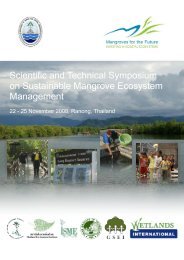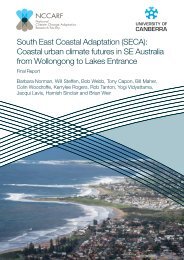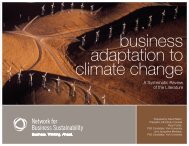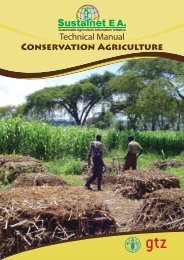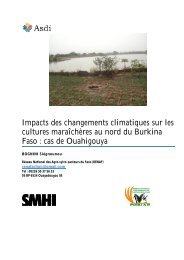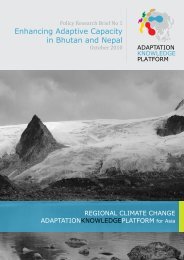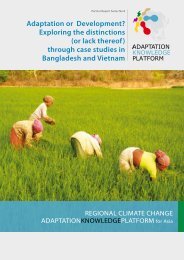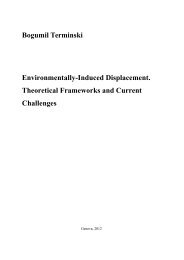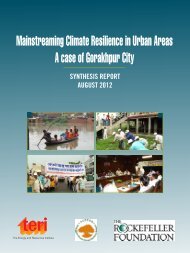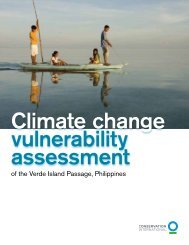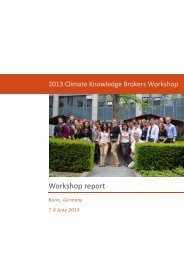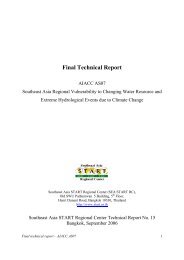oth backyard gardeners like himself <strong>and</strong> commercial producers in <strong>and</strong> aroundMelbourne:The weather <strong>change</strong>s are a real concern, we’ve seen a progressive decline in theweather, <strong>and</strong> I’ve had to <strong>change</strong> my strategies about how I grow [my plants], howI prune [my trees] so they get more air circulation, putting them in warmer spotsso they dry more quickly… Now what we’re getting is much shorter summers <strong>and</strong>sudden fluctuations in spring [Backyard gardener <strong>and</strong> permaculturalist,Melbourne].This gardener also commented on the milder winters, which seem to many to beanother trend for Melbourne:It didn’t get cold enough for a lot of plants to die down, so that asparagus, whichshould die down in winter, <strong>and</strong> produce new spears in the spring, it didn’t do that,it was far too mild. We had some fruit trees flower for a second time, which theydon’t normally do, because it stayed warm into late autumn… [The mild wintersare] a real worry, [especially for commercial growers]. A lot of fruit requires acertain chill temperature, so they can produce in the spring. Because our wintersare getting milder, we might not get enough chill period for the apples to produceproperly. [Backyard gardener <strong>and</strong> permaculturalist, Melbourne].The disturbed water cycle was also a talking point on the Gold Coast, especially afterthe 2010/2011 floods. A well-established organic farming couple, with over 15 years’experience farming on Mount Tamborine, in the Gold Cost hinterl<strong>and</strong>, explained howthe <strong>change</strong>s in rainfall patterns <strong>and</strong> volumes has affected them in the past few years:Talking about weather, you were talking about <strong>climate</strong> <strong>change</strong> <strong>and</strong> that, we’vehad two of the worst years in 16 years you know, last year it was the floodswhere whilst it didn’t flood on the mountain it was three months of persistent rain<strong>and</strong> no sun <strong>and</strong> we got to a stage where by March, for the first time, we didn’thave anything to pick, you know it was so waterlogged, <strong>and</strong> because there hadn’tbeen any sun, nothing was growing if you put a seed in, it wouldn’t grow[Farmers, Gold Coast].Another interviewee in Melbourne commented that water restrictions made backyard<strong>and</strong> community gardening difficult, especially for those who did not have rainwatercapture <strong>and</strong> storage tanks:In the drought, when we were on 3 <strong>and</strong> 3A water restrictions, there was noaccommodating people who wanted to grow their own <strong>food</strong>…You had to apply forexemptions. Some schools got exemptions, to keep watering their schoolgardens. But that wasn’t available to households [Academic researcher,Melbourne].Water <strong>security</strong> emerged from this research as a major consideration when thinking ofthe nexus between <strong>urban</strong> agriculture, <strong>urban</strong> <strong>food</strong> <strong>security</strong>, <strong>climate</strong> <strong>change</strong> <strong>and</strong> <strong>urban</strong><strong>resilience</strong>. However, as pointed out by one of the participants, there is a certain irony tothe prevailing system of water allocations <strong>and</strong> restrictions, <strong>and</strong> how this is perceived bythe wider community:Supposedly we’ve got a water shortage, <strong>and</strong> we’ve got people growing citrusorchards that are very unsustainable water-wise, <strong>and</strong> we’re doing it in semi-arid,<strong>Urban</strong> <strong>food</strong> <strong>security</strong>, <strong>urban</strong> <strong>resilience</strong> <strong>and</strong> <strong>climate</strong> <strong>change</strong> 129
half-desert environments. We’re growing sugar cane, which uses massivequantities of water, in really dry areas. These growers are getting subsidisedwater: cotton is terrible, sugar-cane is worse [in terms of water usage]. We’re alsogrowing semi-aquatic rice, in the driest parts of Australia…There has been a lotof complaints by gardening groups, <strong>and</strong> calls for the government to give people in<strong>urban</strong> environments incentives to grow their own <strong>food</strong>, by giving them water atthe same rate that the farmers get it. We’re being charged a fortune for waterhere, but the irony is that 80% of all water usage is in [commercial] agriculture.Eight per cent is in <strong>urban</strong> environments, twelve per cent is industry. So whilepeople are putting their toilets on half-flush <strong>and</strong> things like that, if you were tonuke all the <strong>urban</strong> centres <strong>and</strong> populations of Australia, you would only saveyourself eight per cent of the water, which is really quite insignificant in the largerscale of things [Backyard gardener <strong>and</strong> permaculturalist, Melbourne].Climate <strong>change</strong> is however seen not only as a concern but also as an opportunity. Forexample, one of the commercial farmers we spoke with specialising in hydroponicproduction saw their business as being significantly impacted by <strong>climate</strong> <strong>change</strong>, butin a positive way:With the igloos, we can control the temperature… So next year, we do want theheavy rain, we do want the crazy weather, because we know that the otherfarmers who use the traditional growing methods will struggle with that, <strong>and</strong> wewon’t. So <strong>climate</strong> <strong>change</strong>s actually work in our favour, the bad weather outsidewill cause production difficulties for other producers [but not for us]. For us,<strong>climate</strong> <strong>change</strong> is a market opportunity [Hydroponic market gardener,Melbourne].Similarly, but on a different scale, <strong>climate</strong> <strong>change</strong> did not seem to be a cause for fear inQueensl<strong>and</strong>. A micro farmer on the Gold Coast suggested that small scale, diverse <strong>and</strong>local production might hold the key to <strong>food</strong> production under <strong>climate</strong> <strong>change</strong> scenarios,especially through the application of organic growing methods. This micro farmerexplained that <strong>climate</strong> <strong>change</strong> was unlikely to affect his crops because of his emphasison organic gardening techniques:I think more along the lines of what we're doing here is not [destructive], it's moreregenerative than taking out of the system....We make all our own soils. It's thesoils that are the focus. Okay we use a fair bit of water I suppose, but the wateruse, because of the way we make the beds, the beds hold moisture really, reallywell <strong>and</strong> we're having a lot of organic matter in beds. We plant so that by the timethe plants get up basically the whole bed's covered anyway. If you look at thosebeds out there, most of them are pretty close together <strong>and</strong> the soils not reallyexposed at all, so from a moisture perspective <strong>and</strong> from a rain perspective,<strong>climate</strong> <strong>change</strong> will not affect us [micro-farmer, Gold Coast].A founding member of Gold Coast Permaculture, explained that even if <strong>climate</strong> <strong>change</strong>affected his micro-farm, if there is a de-centralised system of small scale micro farmsacross the region, <strong>climate</strong> <strong>change</strong> would not be a problem:This sort of stuff here [Gold Coast Permaculture] addresses a lot of <strong>climate</strong><strong>change</strong> issues. But there is just no way that we can live long like this, <strong>and</strong> there isnothing we can do to come back from the point that we are at. It does not mean<strong>Urban</strong> <strong>food</strong> <strong>security</strong>, <strong>urban</strong> <strong>resilience</strong> <strong>and</strong> <strong>climate</strong> <strong>change</strong> 130
- Page 1 and 2:
Synthesis and Integrative ResearchF
- Page 3 and 4:
Published by the National Climate C
- Page 5 and 6:
ABSTRACTFood security is increasing
- Page 7 and 8:
1. a review of the literature: on n
- Page 9 and 10:
its Food for All project. This help
- Page 13 and 14:
In response to the existential thre
- Page 15 and 16:
2. OBJECTIVES OF THE RESEARCHFood i
- Page 17 and 18:
debates and to the more systematic
- Page 19 and 20:
organisation in the past few years.
- Page 21 and 22:
4. RESULTSIn this section we presen
- Page 23 and 24:
increasing productivity. Thus, whil
- Page 25 and 26:
people and the origins of their foo
- Page 27 and 28:
urban food supply chains. Thus, whi
- Page 29 and 30:
This logistics system is dominated
- Page 31 and 32:
Like Hodgson et al., as per definit
- Page 33 and 34:
esilient, powerful by being locally
- Page 35 and 36:
volume or even its contribution to
- Page 37:
community food growing can have on
- Page 40 and 41:
generations this history has been f
- Page 42 and 43:
a stronger focus on addressing the
- Page 44 and 45:
The third key aspect is fairness -
- Page 46 and 47:
climate (which we live and work in
- Page 48 and 49:
agriculture. Eight percent is in ur
- Page 50 and 51:
This concept of the ‘spaces in be
- Page 52 and 53:
esearch scientist and chair of the
- Page 54 and 55:
As discussed above, protection of t
- Page 56:
4.2.5 What is the extent and the im
- Page 60 and 61:
no place under the panoply of pract
- Page 62 and 63:
increased, the market dominance of
- Page 64 and 65:
… the residents of S Park called
- Page 66 and 67:
5. CONCLUSIONSThere is growing conc
- Page 68 and 69:
urban resilience. This inevitably c
- Page 70 and 71:
In many respects these contrasting
- Page 72 and 73:
Many interviewees of both standpoin
- Page 74 and 75:
a given area. The rationale for thi
- Page 76 and 77:
mapping the location of sources of
- Page 78 and 79:
Australian food policy debates refl
- Page 80 and 81:
APPENDIX 1: URBAN FOOD SECURITY, UR
- Page 82 and 83:
IntroductionGlobally, and in Austra
- Page 84 and 85:
Review methodsThis stage of the res
- Page 86 and 87:
despite many of the causes of food
- Page 88 and 89: …by 2050… food production will
- Page 90 and 91: 2. How is food security (in general
- Page 92 and 93: the food security of cities, but no
- Page 94 and 95: While some see the density of devel
- Page 96 and 97: when suppliers, distributors, and c
- Page 98 and 99: a more prominent role in enhancing
- Page 100 and 101: community gardens webpage on the Co
- Page 102 and 103: comprehensive description of the ca
- Page 104 and 105: In both the developed and developin
- Page 106 and 107: Their review notes a significant in
- Page 108 and 109: lines of supply from often rural pl
- Page 110 and 111: 1 IntroductionCities have always be
- Page 112 and 113: Despite some attempts to curb urban
- Page 114 and 115: the Gold Coast remains a city that
- Page 116 and 117: ackyard/community gardenernot affil
- Page 118 and 119: level in local government. VicHealt
- Page 120: Figure 2: Impacts on Municipal Food
- Page 125 and 126: security I recognise that the cost
- Page 127 and 128: United States, he offered the follo
- Page 129 and 130: This vision highlights the multi-fu
- Page 131 and 132: An environmental education centre.
- Page 133 and 134: Melbourne Food ForestA Melbourne ga
- Page 135 and 136: stakeholder consultations, the repo
- Page 137: can. We sense the changes. The earl
- Page 141 and 142: etain its basic function and struct
- Page 143 and 144: government; and that trying to get
- Page 145 and 146: the north and the west, where it wo
- Page 147 and 148: Why do people buy so much food that
- Page 149 and 150: urban agriculture (however broadly
- Page 151 and 152: enefits and risks. Before we can co
- Page 153 and 154: Another important and tangible role
- Page 155 and 156: coast without any problems whatsoev
- Page 157 and 158: BIBLIOGRAPHYAECOM (2011) Scoping St
- Page 159 and 160: Burns, C. I., A. (2007). Measuring
- Page 161 and 162: Edwards, F., & Mercer, D. (2010). M
- Page 163 and 164: James, S. O’Neill, P. and Dimeski
- Page 165 and 166: Millar, R., 2012, ‘Government shi
- Page 167 and 168: Saltmarsh, N. M., J; Longhurst, N.
- Page 169 and 170: Walker B., 2008, Resilience Thinkin



